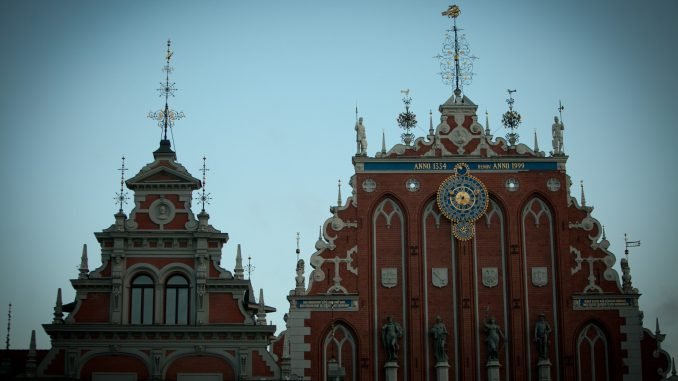
Kremlin’s ghost over Riga Summit (I)
Leadership of Angela Merkel
EU Council President Donald Tusk noted in Riga that the summit was held in the atmosphere of intimidation and threats, even though he did not mention the country responsible for it. German Chancellor Angela Merkel was less compromising. On 10 May, after laying a wreath on a monument to the killed soldiers of World War Two in Moscow, she did what no other Western leader had done: standing next to Vladimir Putin, she made an open statement about the “criminal and illegitimate annexation” in Ukraine. The statement was so direct and powerful that the official Russian translation left out much of it, leaving just the word “annexation”.
In Riga, Merkel has confirmed that Moscow has no place at the G-7 table and will not have, at least in the short term. With her words the German chancellor hit the most sensitive spot for the Russians and Putin personally – she refused to acknowledge Russia’s greatness and importance. She simply passed a fair judgement on Russia’s actions.
All the participants in Riga signed a joint declaration, calling Russia’s actions in Crimea “illegal annexation”. It is an important legal term that was accepted unanimously by the entire EU, one it will have to stick to once the issue of renewing sanctions on Russia comes up.
Belarus presented a curious position. Minsk said it did not want to consider the Crimea issue without Russia at the table, so it opposed Crimea’s mention, yet it did not dispute the term “annexation”.
President steps on a rake
Some Riga Summit insiders have shared their impressions with me that the Latvians did not do a very good job of diplomatic preparations. This might be why Latvian Foreign Minister Edgars Rinkevičs called the event a “survival meeting”. Because this drama of survival could have ended in a catastrophic denouement.
His prophesies did not materialize and, at least from the Lithuanian perspective, the biggest catastrophe was President Dalia Grybauskaitė‘s interview to Latvian TV. It just so happened that the main message about Lithuania in the Riga Summit was the bad situation that the president found herself in, which overshadowed any possible criticism for the Latvians’ inaction and toning down the declaration.
The Latvian journalist, having refused to cut the inconvenient part of the interview as per Grybauskaitė’s demand, endeared himself to two camps: those who want their politicians to reply to any questions and those who do not want to hear about Russia’s aggressive policies. Unfortunately, the president stepped on the rake and was partially “neutralized”, as in the Lithuanian media her comments on the Riga Summit were drowned in discussions about the mishandled interview.
No St. Christopher in the EU
Meanwhile Merkel, the leader of the EU’s German powerhouse, reiterated once again the unchanging position that Eastern Partnership is not an instrument for expansion. The final declaration acknowledged – not without Lithuania’s insistence – the partners’ European aspirations and choice of European development. A stronger wording – “celebration” rather than “acknowledgement” – failed to pass, but both aspiration and choice were noted.
These details of fine-tuning the declaration attest to the EU’s consistency. The Eastern Partnership programme is not meant to drag someone to Europe. According to Tusk, it is not a beauty pageant between Russia and the EU. But it just so happens that, to many, EU prosperity is more attractive than Russia’s dictate. No one dragged nor begged Lithuania to join the EU. It was we who had been pleading to be accepted and had to prove our worthiness with deeds.
Eastern Partnership is not an enticement from the rich guys – rather, it’s an offer of an alternative to the Russian path. It’s an open door with a high threshold: only mature enough countries can step over it. There’s no St. Christopher to carry everyone across. No one will lift aspiring nations up, but there’s Russia to drag them down. The danger has already been noted and recognized, which is a good start for a successful defence effort.
The Riga Summit revealed an interesting fact: 28 EU member states are able to compromise and agree on both declaration wording and practical action(e.g., Ukraine will receive EUR 1.8bn in support), while reaching agreement with the six partners is much more challenging. On the one hand, this should serve as a warning that there is still a long way ahead for the partners towards the EU; on the other hand, a confirmation that each partner is different.
The EU’s previous expansion happened in chunks of countries, so out of habit the six Eastern Partnership states have been treated as a block. This is hardly surprising, even the EU’s new members from Eastern Europe have long been seen by EU veterans as a uniform group; only recently have we had our differences acknowledged, largely thanks to politicians like Hungary’s prime minister or the Czech president.
The main achievement of the Riga Summit is, I think, the acknowledgement of differences among the six EU partners, recognition of their individual character; from now on the programme will be developed with each member individually and according to the needs of each. The ghost of the Kremlin haunting Eastern Partnership has forced the EU to take a better look at its partners, to be more flexible, but not to retreat.
The Riga Summit showed understanding that Russia’s world-view differed radically from the EU’s. Moreover, it prides itself on completely different things than European nations. Latvia, for example, has spend millions of euros on a modern building for the National Library which served as the venue for the summit. Meanwhile Russia keeps increasing military spending and showing off a new tank. Knowledge and communication has given humanity more than weapons and isolation. There’s no reason to think this rule will change.

Be the first to comment